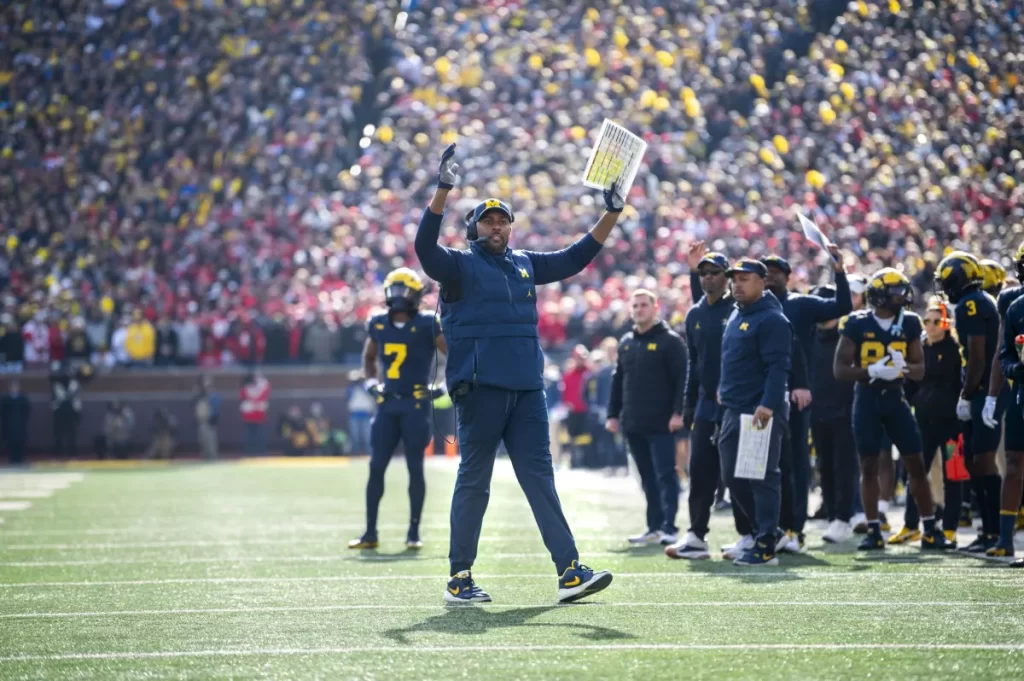Jim Harbaugh, the former head coach of Michigan, was sitting next to Nick Saban at the Rose Bowl head coach press conference on New Year’s Eve when he couldn’t help but think back to his childhood in the Midwestern tundra, watching football played in beautiful Southern California.
Looking back, he may have also given some indications about what he intended to do in the future.
“You watch the Rose Bowl on New Year’s Day as a child. With a few feet of snow on the ground, you’re lying on your stomach in front of the TV with your hands in that position, gazing out at the football game, the parade, and palm trees,” Harbaugh remarked. “.. I’m aware of the reason why many individuals from the Midwest presumably relocate to California. You desired to be present.
As much as the Wolverines would like to retain their current staff following their run for a National Championship, many would find it impossible to resist the allure of the idyllic Midwesterner utopia that Harbaugh described, paired with his NFL coaching expertise. All of the assistants on the team from the previous season were hired by Harbaugh, so it makes sense that some of them decided to go to the league to continue working under him, further their careers, and get more vitamin D.
Although Moore’s hiring appeared to be in opposition to the stability that was desired, the Wolverines’ coaching staff is actually as stable as any program could hope for following a National Championship.
To begin with, a National Championship is a huge plus for any coach’s resume. A coaching change was inevitable regardless of Harbaugh since his assistants would have had offers to take over another university program or to serve as assistant coaches in the NFL. The way Michigan is managing its coaching turnover speaks something about the stability it indicated when it promoted Moore.
First up, the coaching staff on defense, which on the surface appears to have been the most severely damaged by Harbaugh’s exit, is our focus. With the departure of defensive coordinator Jesse Minter, defensive line coach Mike Elston, and defensive backs coach Steve Clinkscale for Los Angeles, the Chargers’ 2024 defensive staff appears to be more similar to Michigan’s than the Wolverines’ own. With Harbaugh having everyone and Michigan having no one, Moore and company must be forced to inconveniently remake a wheel that was functioning so well, right?
Not only do the Wolverines not need to create the wheel from scratch, but they also possess the creator himself. Former defensive coordinator Wink Martindale of the Baltimore Ravens under John Harbaugh was the coach of Michigan’s 2021 defensive coordinator Mike Macdonald and 2022–2023 defensive coordinator Minter.
Even if any Harbaugh-to-Harbaugh transfers moving forward will be coast-to-coast, the defensive coaching pipeline from Harbaugh to Harbaugh that produced so much success for the Ravens over the last four seasons performed admirably once more. Martindale oversaw the defensive strategy that was so essential to a National Championship’s development and conclusion. His hire keeps the defensive coaching staff and structure as intact as possible to go along with a team returning plenty of production next season, even though the losses leave more places to fill.
Conversely, the offense, which is losing a lot of players to the NFL Draft, is as stable as it gets from a coaching standpoint and doesn’t seem to be affected by Harbaugh’s departure. The offensive coordinator from the previous season is really the head coach this year. Kirk Campbell, the quarterbacks coach, will take over as offensive coordinator, Grant Newsome, the tight ends coach, will oversee the offensive line, and Steve Casula, the former Michigan analyst, will return to Ann Arbor to oversee the tight ends. The offensive staff still needs to fill up, but any major changes that may have halted the momentum for the National Title have been averted.
Despite a high but largely inevitable departure rate, the assistant coaching staff of the Wolverines is gelling together all things considered. In comparison to programs like Ohio State, which aren’t even going through a head coaching transition, it’s turning out to be an even more consistent process and outcome. Coach Ryan Day wanted to change things up on offense, so he hired Bill O’Brien, the offensive coordinator for the Patriots and former head coach of the Texans, to take over as offensive coordinator. However, O’Brien left to take a head coaching position at Boston College a few weeks later. Chip Kelly, the head coach of UCLA’s Big Ten rival, then departed the Bruins to accept the position of OC in Columbus.
In other words, coaching moves take place at every program around this time of year. They can’t be avoided, just like the sun in California and the snow in the Midwest. Allowing those modifications to undermine a program’s objectives and vision is preventable, and Michigan was sure to avoid doing just that. With thoughtful external hiring and internal advancements, the Wolverines are maintaining the stability they initially aimed for when they appointed Moore to succeed Harbaugh.
As Harbaugh said before the Rose Bowl, it’s easy to know why so many people move from the Midwest to California — him taking an NFL head coaching job there just adds to the list of reasons why for Michigan’s assistant coaches. But the Wolverines haven’t been left out in the cold with those moves.
Instead, Michigan is making the right hires to keep instability far from Schembechler Hall.

